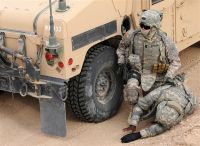HAMPTON, Va. — Ensuring that Afghanistan’s security forces are trained and equipped to assume increased security responsibility is a keystone of the U.S. and coalition strategy there.
Navy Petty Officer 1st Class Darrell T. Mangham recognizes that. But as a hospital corpsman with extensive preventive medicine expertise, he also knows that the train-and-equip mission can be brought to its knees if illness or disease infiltrates the force.
Mangham spent a year in Afghanistan helping to stand up preventive medicine programs he said will have a long-term impact, not just on the Afghan National Army and Afghan National Police, but also on the country’s civilian population.
For his efforts, Mangham became the first enlisted U.S. service member to receive the prestigious Hunter-Strickland Excellence Award for Deployment Preventive Medicine. This year’s award, presented yesterday at the Armed Forces Public Health Conference here, is named for Army Col. George W. Hunter III and Army Capt. G. Strickland, pioneers in advancing tropical disease prevention during the 1940s.
Mangham was singled out this year as the service member who best exemplified their work in a deployed setting -– in his case, as assistant chief of preventive medicine for the NATO-led International Security Assistance Force training mission in Afghanistan from February 2009 to February 2010. Currently assigned to the Naval Medical Center in San Diego, Mangham knew he could serve as a corpsman supporting U.S. Marines fighting enemy forces alongside their Afghan counterparts. But instead, he volunteered to help the Afghan security forces confront a less-recognized but equally insidious enemy: illness and disease spread through poor hygiene, improper food storage and handling, and unsanitary living and sleeping arrangements.
“I volunteered for this,” Mangham said of his first deployment with the Afghan army. “I wanted to go and assist at the ground level in rebuilding Afghanistan as a nation.” Once on the ground in the Afghan capital of Kabul, Mangham said, he began building on groundwork already laid as a mentor to the Afghan National Army’s surgeon general’s public health chief. He led teams that inspected the way the Afghans were shipping, storing, preparing and handling food for the army and police forces. Two of the big gaps he found were lack of refrigeration and specific guidelines regarding food.
So, working through the U.S. Agency for International Development and other organizations, Mangham helped to secure funding needed to buy refrigerators and food-storage units. He also initiated training for food-service personnel.
Mangham also began looking into living conditions for Afghan security forces. One problem, he said, was that Afghan troops often shared the same bunk –- an accepted cultural norm in Afghanistan, but one Mangham said makes it too easy for illness and disease to spread.
He helped to introduce a new ban on bunk-sharing, instituting a rule that bunks must be three feet apart, with troops positioned in alternating head-to-toe arrangements. “That way, if one soldier sneezed, the germs wouldn’t immediately go to the next soldier,” he said. “That decreases the passing of viral diseases.” Those efforts resulted in a 40-percent decrease in disease transmission among the Afghan forces, he said.
Operating in the southern Kandahar and Helmand provinces, Mangham also served as senior noncommissioned officer of a six-person team that initiated medical screening and vaccination programs at Afghan National Police recruiting stations.
In addition to providing personal hygiene training, the team members isolated police candidates with contagious illnesses, treating them before allowing them to rejoin the ranks. Other initiatives Mangham helped to introduce are just now starting to bear fruit. He helped in standing up an Afghan public health officer program, and its first class graduated three weeks ago.
“It was a very, very successful mission,” he said of his deployment. “We got a lot accomplished in the year I was there and left a lot of initiatives in place. The mission is successful and thriving. I think we are going to see the state of public health in Afghanistan thrive in the next two to three years.”
Mangham called these efforts an important contribution toward a more independent Afghanistan with a military more capable of providing security. The impact, he said, will remain long after the U.S. and coalition mission in Afghanistan ends. “This goes way beyond the military,” he said, noting that the preventive medicine lessons being learned will extend to Afghanistan’s civilian population.
“I can train an Afghan doctor in public-health issues,” he added, “but he’s the one who is going to be most effective in getting that message across to the Afghan people.” Mangham said he is honored to receive this year’s Hunter-Strickland Excellence Award for Deployment Preventive Medicine.
“But this is not something I did as an individual,” he said. “There were a lot of key players in this effort. I am just one of them.”
Source:
U.S. Department of Defense
Office of the Assistant Secretary of Defense (Public Affairs)

 von
von 